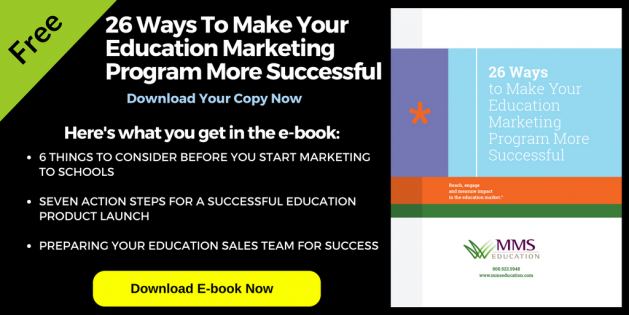It doesn’t matter whether you have one or several new sales representatives joining your team, or if you are starting a team from scratch, how you train your team and prepare them for selling to the education market will have a huge impact on their performance—and your sales results. Here are just a few tips and lessons learned from more than three decades of training, managing, and overseeing inside sales teams dedicated to the education market.
To begin with, a lot of time and careful consideration should go into recruiting and choosing the right candidate to fill a sales position. Selling to the education market takes a special type of sales representative. Yes, they need to be assertive and have a healthy dose of self-initiative and drive, but they also need patience and the ability to maneuver through mountains of bureaucracy, committees, and obscure decision-making. It is important to remember that education sales representatives are selling into one of the largest government bureaucracies around—the school market. Paperwork, red tape, and slow decision-making are paramount. It is important to select candidates that also have excellent communication skills and know how to probe, listen carefully, ask pertinent questions, and develop ongoing relationships with prospects and customers.
Taking sales representative that are new to the education market and molding them into top-notch education sales or sales-support representatives is important to your sales success. The more seasoned and knowledgeable a sales representative is about the education market, the better the customer experience will be overall. A few things to consider when training your sales/support team is to divide the training into categories and sections. Comprehensive sales training should focus on at least four core categories, as outlined below.
1. Education Market Knowledge
Market
- How big is the education market, in terms of number of institutions, buyers and expenditures?
- Which states are the top producers for your product or offer the greatest opportunity?
Funding
- Where’s the money? What funds are available for your product or programs?
- What is the funding/budgeting cycle and how does that work with the sales schedule?
Audience
- Who is your customer (by job title)? Are they principals, curriculum coordinators, or teachers? Where are they located (district or building)? Who are the decision makers, influencers, and end users for your product?
2. Product Knowledge
Product
- What problem does your product or program solve for your customers?
- Why was the product or program created?
- Who has used it and what are the results or impact?
- What are the outcomes or expectations for customers that use your product or program?
- What are the features and benefits? Remember that benefits, not features, sell a product.
Competition
- Who is your competition (direct and indirect)?
- How does your product or program compare to the competition? What is your differentiator?
- What do you offer that is singular, unique, and different?
3. Communication and Sales Skills
- What is the difference between listening and hearing? Are your reps really listening (not just hearing) and understanding what isn’t being said as well as what is said?
- How can they develop probing and questioning skills to help them identify those customers that are truly interested, and have the budget and decision-making capacity versus those that aren’t qualified?
- What is the best way to find and develop new prospects and leads?
- How do your reps qualify leads and move them through the sales funnel?
- What is the best technique to overcome objections? How do you overcome the “we don’t have any money” excuse?
- How to complete the sale and keep sales after the customer says yes?
- How are your reps managing their time and territory for the greatest productivity?
4. Technology and Systems
- Are your representatives well trained to use all systems – CRM, email, conferencing tools for presentations – for the greatest productivity?
- What are best practices in terms of conducting product demonstrations and webinars?
Becoming a good salesperson is all about earning the trust and respect of the customer. The more your sales representatives can demonstrate they understand the market and the challenges their customers face, the more they’ll earn that trust and respect. Our experience indicates that before sales representatives begin selling or talking with customers in the education market, it is extremely helpful if he or she has a good understanding and background information about the market, the structure, and decision-making process, as well as the funding streams.
Before a representative begins selling, it is also helpful to have him or her interview several satisfied customers to hear, in the customer’s own words, why the customers really like the product or program, what they find most helpful or useful about the program, and why they would recommend it to a colleague. The more representatives can hear from the actual user, the more authentic and genuine they will be when they talk with potential customers. And finally, before a new representative begins talking with customers, it is very beneficial to have them practice and role play with other representatives until they become comfortable discussing the product using their own words.
MMS Education has developed and managed inside sales teams, customer service, and technical support teams dedicated to the education market for more than four decades. In addition to providing these teams as an outsourced service, we have also trained our clients’ inside sales teams at their offices and have developed a complete sales-training curriculum focused on the education market, which can be customized for any client. Call us today at 866-382-6116 or fill out this form to see how MMS Education can help you reach, engage, and measure impact in the PreK-12 education market.

